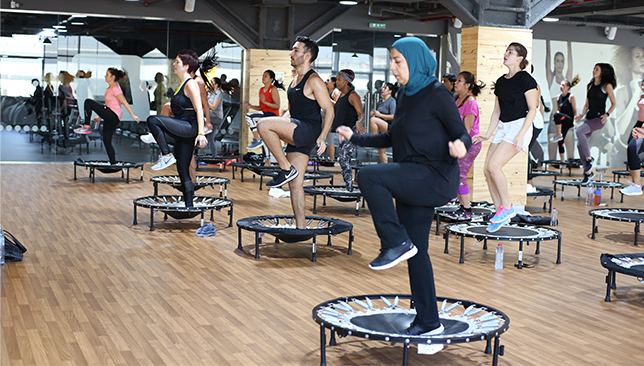
It is that time of the year when many if not most people are discussing or considering workout best practices while fasting during Ramadan.
Jason Young and Hussain Al Ajmi,personal trainers at GymNation, share their tips and bust myths on the topic for workout veterans and first-timers.
What are some myths about exercising during Ramadan?
Myth 1: Exercise is a waste of time during Ramadan
Truth:
Hussain Al Ajmi (HA) – It is really important to keep up your exercise routine as much as possible in Ramadan so that there is a lesser impact on your body due to any dietary or lifestyle changes.
Jason Young (JY) – maintaining your exercise regime combined with a healthy diet and lifestyle is scientifically proven to have an immense impact on improving energy levels, which would be beneficial for those who are fasting. On the contrary, to discontinue your exercise regime for a month can, in fact, have several negative side effects on the body such as mental and muscle fatigue, loss of muscle and fitness.
Myth 2: I can eat anything at all since I am fasting
Truth:
HA – You have to watch what you eat during Ramadan, just because you are not eating during the day does not mean that you can eat mindlessly when and after breaking your fast. Try to maintain a healthy diet as much as possible.
Myth 3: I’ll lose weight because I’m not eating all day
Truth:
JY – Just because you are not eating throughout the day, your body’s need for exercise does not disappear. You should still aim for at least 30 minutes of physical activity per day to maintain and improve your mood, energy levels, and body and mind function overall.
During Ramadan, what should people avoid or include in the meal before working out?
HA – Before working out, it is important to have carbs, both complex and simple, which are the primary source of energy for the body. It is also important to include a good source of protein in your Iftar meal in order to avoid muscle breakdown during the workout. Foods that are high in fat (especially trans-fat) is to be avoided as much as possible before a workout.
JY – It is easy to indulge in food during Ramadan. However, Iftar and Suhoor meals should be a simple and well-balanced meal, not a feast, and should not differ substantially from your normal everyday diet.
To maintain a balanced and nutritious diet, a person should consume food from all the major food groups, equally distributed between the two meal times.
The major food groups are:
There are certain foods that should be avoided such as:
What is an ideal time gap to maintain between the meal and workout?
HA – An ideal time gap between Iftar/a meal and the workout should be 2-3 hours, which is enough time for your body to digest the food.
JY – As a general guide, all workouts should be kept between 30 to 60 minutes and cardiovascular exercises should be limited to twice a week. Ideally, the best time to exercise is just before Suhoor mainly because you should be energetic after Iftar as your body would have digested the food by this time.
Any tips for people who choose to work out during the hours of fasting?
HA – Tip 1: Keep the workout at medium intensity, and don’t try to break world records! Simply going to the gym and carrying out low-intensity exercise during the hours of fasting is a good goal in itself.
Tip 2: Try to work out a few hours before Iftar, that way Iftar can be your post-workout meal.
Tip 3: Track your calories and make sure you’re not in a severe caloric deficit
JY – Like Hussain said, exercise for maintenance rather than gains.
Is there a workout duration or goals that are ideal for people who are fasting?
HA – Workouts during Ramadan don’t have to be intense. If you are aiming to maintain your strength levels, then keep up the rest between your sets. If preventing fat gain is your goal then keep the workout short, sharp and at an intensity level that is comfortable with less rest between intervals. Remember that your body is not getting the usual nutrition, so listen to how it is reacting to exercise and adjust your goals accordingly.
JY – I would personally advise that all workouts for those fasting during Ramadan should be kept between 30-60 minutes per session. I recommend exercising at least three times a week and regardless of your fitness goals, I would also advise that the intensity of a work out to be reduced during this period.
Is it ideal to set new fitness goals while working out during Ramadan, especially if you are a beginner?
HA – Setting new fitness goals and habits in Ramadan can be tough but it is encouraged. Having said that, do what you feel is within your reach, don’t aim too high. Set small, measurable and realistic goals for yourself even if that is just walking for 30 mins per day. At the end of Ramadan, when you get back to your normal exercise routine it won’t be as hard on the body and you will be happy you made the effort.
JY – I believe it truly depends on each individual’s goals; however, for those who do already work out, in my opinion, maintenance is a realistic target during Ramadan. It is unlikely to add lean or mass muscle when not eating at regular intervals. For those who are looking to keep fit or are already on a weight loss regime then regular exercise will maintain energy levels and keep the individual on their path to reach their goal.
During Ramadan, GymNation will remain open 24 hours every day with classes starting at 6.30 am and running till late. Ramadan class timetable is available here.